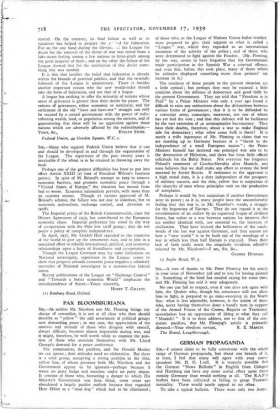PAX BLOOMSBURIANA
Stn,—As neither Mr. Nicolson nor Mr. Fleming brings any charge of cowardice, it is not at all clear why they should describe as " yellow " the odd assortment of political groups now demanding peace ; in any case, the appreciation of the motives and attitude of those who disagree with oneself, always difficult, becomes almost impossible during war, and it might, therefore, be well worth while to examine the posi- tion of those who associate themselves with Mr. Lloyd George's demand for a peace conference.
The communists, the pacifists, and Sir Oswald Mosley we can ignore ; their attitudes need no elaboration. But there is a solid group, occupying a strong position in the thin, yellow line, of whose presence both Mr. Nicolson and the Government appear to be ignorant—perhaps because it wears no party badge and marches under no party slogan. It consists of those who, foreseeing a danger to which His Majesty's Government was then blind, some years ago abandoned a largely pacifist outlook because they regarded Herr Hitler as a " mad dog " which had to be eliminated ; of those who, as the League of Nations Union ballot testified were prepared to give their support to what is called a " League " war, which they regarded as an international extension of the activity of the police ; and of those who were determined to fight against the Fascists. (Mr. Fleming, by the way, seems to have forgotten that the Government made participation in the Spanish War a criminal offence, and even that, before this took place, many of those whom he ridicules displayed something more than printers' ink heroism in it.)
The reactions of these people to the present situation are a little cynical ; but perhaps they may be excused a little cynicism about the defence of democracy and good faith by the present Government. They are told that " Freedom is in Peril " by a Prime Minister who only a year ago found it difficult to raise any enthusiasm about the distinctions between various forms of government ; that it is to be defended by a conscript army, conscripts, moreover, not one of whom has yet had the vote ; and that this defence will be facilitated by the vast extension of an unimaginative bureaucracy. They have their doubts, therefore, about a war to make England safe for democracy ; what other casus belli is there? It is surely a trifle ingenuous of Mr. Fleming to claim that we are standing up to Germany because of a " threat to the independence of a small European nation " ; the Prime Minister himself has declared our principal war aim to be the destruction of Hitlerism, and there has been little official solicitude for the Baltic States. Not everyone has forgotten Poland's treatment of Czecho-Slovakia after Munich, and none believes that we shall make any effort to restore the land annexed by Soviet Russia. If resistance to the aggressor is a high moral duty, it is a duty independent of the prospects of military success, and the thin, yellow line is suspicious of the sincerity of men whose principles wait on the production of aeroplanes.
Perhaps it would be less suspicious if another Government were in power ; as it is, many people have the uncomfortable feeling that this war is, in Mr. Gunther's words, a struggle for the hegemOny of Europe. They do not regard it as the extermination of an outlaw by an organised league of civilised States, but rather as a war between nations for interests that are neither identical with, nor essential to, the interests of civilisation. They have learned the hollowness of the catch- words of the last war against Germany, and they cannot see how a " new world " is to be built out of the wreckage of a war in which less than half Europe is engaged. Does their lack of faith really merit the singularly invidious adjective selected by Mr. Nicolson?—I am, Sir, &c.,
GEORGE DUDMAN.
13 Inglis Road, W. 5.
Sta,—A vote of thanks to Mr. Peter Fleming for his article in your issue of November 3rd and to you for having printed it. Something of the kind has needed saying for some time, and Mr. Fleming has said it very adequately.
No one can fail to respect, even if one does not agree with him, the Quaker who, though his conscience will not allow him to fight, is prepared to go mine-sweeping in the North Sea: what is less admirable, however, is the action of those who, never having themselves done a hand's turn in support of the Armed Forces of the Crown, Regular or Territorial, nevertheless lose no opportunity of jibing at what they call " Munich! " It is to their address, not to that of the con- sistent pacifists, that Mr. Fleming's article is primarily




































































 Previous page
Previous page